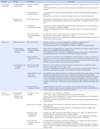Abstract
Purpose
This study developed a short-term education program aiming to strengthen global health capacity in nursing students, and examined the effects of the program.
Methods
The subjects of this study were 83 students recruited from 29 nursing colleges. Domestic workshops and overseas training in the Philippines were offered. For data collection and analysis, the triangulation method was adopted.
Results
Students' critical thinking disposition and global leadership capacity were significantly increased. Thematic content analysis derived fifteen themes: expansion of global health, understanding of cultural diversity, vision of being a global leader, cultivation of communication skills, open mind toward people with different culture, pride and vocation, understanding of nursing in foreign countries, understanding of visiting nurse service, sustainability, understanding of local needs and environments, and education methods with an emphasis on participants, broader view and thinking of the world, reflection on the characteristics of a nurse, development through cooperation, and development through programs.
Figures and Tables
Table 1
Characteristics of Participants (N=83)

Table 2
Comparison of Pre- and Posttest Critical Thinking Disposition and Global Leadership Ability among Participants (N=83)

Table 3
Content Analysis of Students' Reflection and Experience Presented in Daily Reflection Journals (N=83)

References
1. United Nations Development Program. The millenium developmental goals report 2012 [Internet]. New York: United Nations;2012. cited 2014 April 11. Available from: http://www.un.org/millenniumgoals/pdf/MDG%20Report%202012.pdf.
2. Choi JW. Current status and evaluation of ODA in health in Korea [Internet]. Seoul: Health Care Policy Form;2013. cited 2014 August 11. Available from: http://webzine.rihp.re.kr/webzine_201307/w_03_02.html.
3. International Council of Nurses. Vision for the future of nursing [Internet]. Geneva: International Council of Nurses;2010. cited 2014 June 23. Available from: http://www.icn.ch/about-icn/icns-vision-for-the-future-of-nursing.
4. Brown TM, Cueto M, Fee E. The World Health Organization and the transition from "international" to "global" public health. Am J Public Health. 2006; 96(1):62–72. DOI: 10.2105/AJPH.2004.050831.

5. Wilson L, Harper DC, Tami-Maury I, Zarate R, Salas S, Farley J, et al. Global health competencies for nurses in the Americas. J Prof Nurs. 2012; 28(4):213–222. DOI: 10.1016/j.profnurs.2011.11.021.

6. Bradbury-Jones C. Globalization and its implications for health care and nursing practice. Nurs Stand. 2009; 23(25):43–47. DOI: 10.7748/ns2009.02.23.25.43.c6831.
7. Callen BL, Lee JL. Ready for the world: Preparing nursing students for tomorrow. J Prof Nurs. 2009; 25(5):292–298. DOI: 10.1016/j.profnurs.2009.01.021.

8. Giger J, Davidhizar RE, Purnell L, Harden JT, Phillips J, Strickland O. American academy of nursing expert panel report: Developing cultural competence to eliminate health disparities in ethnic minorities and other vulnerable populations. J Transcult Nurs. 2007; 18(2):95–102. DOI: 10.1177/1043659606298618.
9. Long T. Influence of international service-learning on nursing student self-efficacy toward cultural competence. J Nurs Educ. 2014; 53(8):474–478. DOI: 10.3928/01484834-20140725-02.

10. International Council of Nurses. Delivering quality, serving communities nurses leading primary health care. [Internet]. Geneva: International Council of Nurses;2008. cited 2014 August 11. Available from: http://www.icn.ch/publications/2008-delivering-quality-serving-communities-nurses-leading-primary-health-care.
11. Lee NJ. The impact of international experience on student nurses' personal and professional development. Int Nurs Rev. 2004; 51(2):113–122. DOI: 10.1111/j.1466-7657.2003.00200.x.

12. Shin H, Kim ES, Yoo BW, Lee H. Development of a community-based participatory global health project model for primary health care capacity development: A case study from a rural community in Ecuador. J Korean Acad Community Health Nurs. 2010; 21(1):31–42. DOI: 10.12799/jkachn.2010.21.1.31.

13. Lee EJ, Kim YK, Lee H. A study on the cultural competence of community health practitioners. J Korean Acad Community Health Nurs. 2012; 23(2):179–188. DOI: 10.12799/jkachn.2012.23.2.179.

14. Jones AM, Neubrander J, Huff M. A cultural immersion experience for nursing students. Glob Partn Educ J. 2012; 2(1):1–11.
15. Ruddock HC, Turner DS. Developing cultural sensitivity: Nursing students' experiences of a study abroad programme. J Adv Nurs. 2007; 59(4):361–369. DOI: 10.1111/j.1365-2648.2007.04312.

16. Wros P, Archer S. Comparing learning outcomes of international and local community partnerships for undergraduate nursing students. J Community Health Nurs. 2010; 27(4):216–225. DOI: 10.1080/07370016.2010.515461.

17. Facione N, Facione PA, Sanchez CA. Critical-thinking disposition as a measure of competent clinical judgment: The Development of the California Critical Thinking Disposition Inventory. J Nurs Educ. 1994; 33(8):345–350.
18. Yoon J. Development of an instrument for the measurement of critical thinking disposition in nursing [dissertation]. [Seoul]: The Catholic University;2004. 64.
19. Song YS. Research on global leadership competencies of company employees in Korea. J Corp Educ. 2010; 12(2):51–72.
20. Nam KY. Importance-performance analysis on global leadership competency-focus on employees in global enterprises and college students. [master's thesis]. [Seoul]: Hanyang University;2011. 76.
21. Anderson R. Thematic content analysis: Descriptive presentation of qualitative data [Internet]. Williams: Wellknowing Consulting Services;2007. cited 2014 June 23. Available from: http://www.wellknowingconsulting.org/publications/pdfs/ThematicContentAnalysis.pdf.
22. Lee WJ. Research service report: Strategy for globalization capacity building of health care service personnel. [Internet]. Seoul: Ministry of Government Administration and Home Affairs;2012. cited 2014 September 2. Available from: http://www.prism.go.kr/homepage/researchCommon/retrieveResearchDetailPopup.do?research_id=1351000-201200087.
23. Harrowing JN, Gregory DM, Sullivan O, Lee B, Doolittle LD. A critical analysis of undergraduate students\' cultural immersion experiences. Int Nurs Rev. 2012; 59(4):494–501. DOI: 10.1111/j.1466-7657.2012.01012.x.

24. Edmonds ML. The lived experience of nursing students who study abroad: A qualitative inquiry. J Stud Int Educ. 2010; 14(5):545–568. DOI: 10.1177/1028315310375306.

25. Kang SJ, Park MH. The effects of global disaster competency development program on paramedic and nursing undergraduate students. Korean J Emerg Med Serv. 2014; 18(1):83–94.
26. Koskinen L, Tossavainen K. Benefits/problems of enhancing students' intercultural competence. Br J Nurs. 2003; 12(6):369–377. DOI: 10.12968/bjon.2003.12.6.11245.

27. Long TB. Overview of teaching strategies for cultural competence in nursing students. J Cult Divers. 2012; 19(3):102–108.
28. Reid-Searl K, Dwyer T, Moxham L, Happell B, Sander T. Rediscovering the essence of nursing: Exploring the impact of in clinical experience in Thailand for undergraduate nursing students from Australia. Nurse Educ Today. 2011; 31(8):892–897. DOI: 10.1016/j.nedt.2010.12.024.

29. Riner ME. Globally engaged nursing education: An academic program framework. Nurs Outlook. 2011; 59(6):308–317. DOI: 10.1016/j.outlook.2011.04.005.

30. Larson KL, Ott M, Miles JM. International cultural immersion: En vivo reflections in cultural competence. J Cult Divers. 2010; 17(2):44–50.




 PDF
PDF ePub
ePub Citation
Citation Print
Print



 XML Download
XML Download